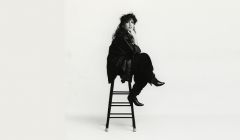
McCann brings The Final Copy of Ilon Specht to Prime Video
The film telling the untold story of the female copywriter who wrote L’Oreal’s iconic ‘Because I’m Worth It’ tagline debuts across global streaming platforms.

This year the need for beauty was more apparent than ever, and that won’t change, writes SEEN Group’s Executive Creative Director Nicola Moulton.

The beginning of a new year, so full of renewed intentions and newly-minted routines, is rich territory for the beauty industry. There’s always a new body brush to try or a miraculous new at home-facial to commit to or a gadget, received for Christmas and then used a handful of times before misplacing the charger.
But this year, resolutions have a different feel to them. It’s less about berating yourself for the things you haven’t achieved and more about congratulating yourself for just getting through it all.
What we’ve seen generally in 2020 is that as the year unfolded, we coped with the feelings of helplessness and the debilitating lack of control over our lives by creating new boundaries, strategies and rules to create a veneer of normality for ourselves. If the first lockdown was about living minute by minute, grasping at new ways to make sense of it all or pass the time, then lockdown 2.0 was about rediscovering autonomy; from enforced screen breaks to a daily dose of nature.
The emotional link that we make between what we use and how we feel has always been present in beauty, but now it’s becoming a given.
Nicola Moulton
The beauty industry very much embodied these psychological shifts, too. In the first part of the year, motivated by endless evenings at home, and being confronted daily by your own appearance on Zoom, there was an overwhelming increase in searches for skincare, and a corresponding uptick in sales of things like starter kits and at-home regimes. The effects of stress led to an increase in rashes, breakouts skin sensitivity and just generally unpredictable skin, so there was also an increased demand for products for sensitive skin, and along with it an unprecedented demand for ‘skincare concierge’ services. Our appetite for talking about the intricacies of our skin suddenly knew no bounds and quite probably, were serving as a proxy for downloading a whole load of other life stresses, too.
All of this led to a mixed picture for the beauty world. Compared to many industries, it stayed remarkably buoyant but the picture varied very much by category. Skincare was up, make up was down. Sales of perfume hit the floor, but sales of home fragrance went up. Even individual products varied wildly: lipstick sales, unsurprisingly, took a nose dive when mask-wearing became mandatory but sales of eye make up were healthy.
Many of these trends, of course, are logistical and will shift again in the coming year. But some habits that beauty consumers have already adopted are, I think, here to stay. The emotional link that we make between what we use and how we feel has always been present in beauty, but now it’s becoming a given. Brands who are able to articulate how their products will connect with your mind as well as your body will resonate strongly next year, as will products that have a soothing or stress-relieving element built-in.
The need to use things that feel effortless and luxurious, and don’t demand too much of the user, will also continue to be a hallmark of beauty. In a year where we’ve often felt weighed down by the sheer impact of things, for many, heading into 2021 will feel as if those weights are, slowly, one by one, being lifted. Subconsciously, beauty consumers are increasingly drawn to things that will not weigh us down further. In our products, we want light, refreshing textures. Packaging that feels easily recyclable. ASMR-inspired content and products and routines that don’t demand too much of us, but that will soothe, renew us and make us feel ourselves again.
One thing that will return next year, though, is the compulsion to introduce colourful make up back into our lives. Sales of lipstick declined in 2020 as mask-wearing made painting your lips seem, well, a little pointless. But beauty always has a way of reminding us why we need it, and so next year, there’s every sign that bright, statement lips will regain their importance.
There’s a new beauty movement called #biglipstickenergy, which is about wearing a bright lip in places and times when you might not necessarily have always done so, at home, on a work call, for a walk in the park. Why? Because a great lipstick can make you feel invincible. Lipstick for its own, fabulous sake becomes more for the wearer than the viewer, and is a new way to reclaim our positivity and self-esteem. It’s a small act of brightness in your day, and a shining example of just why beauty matters.
Nicola is Executive Creative Director at SEEN Group, a creative communications agency specialising in beauty. Prior to SEEN, she worked as a beauty director on titles such as Grazia and Marie Claire. In 2008, she became beauty and health director at British Vogue, a position she held for almost a decade. in 2017 made the decision to combine her editorial career with a new role as Executive Creative Director at Beauty SEEN. The newly-created position sees her predicting and defining the cultural trends which will impact the beauty world, as well as working on brand identity, tone of voice and copy writing. She is passionate about the beauty industry getting both the recognition and respect it deserves, as well as raising the standards of beauty content both editorially and commercially.
Looks like you need to create a Creativebrief account to perform this action.
Create account Sign inLooks like you need to create a Creativebrief account to perform this action.
Create account Sign in